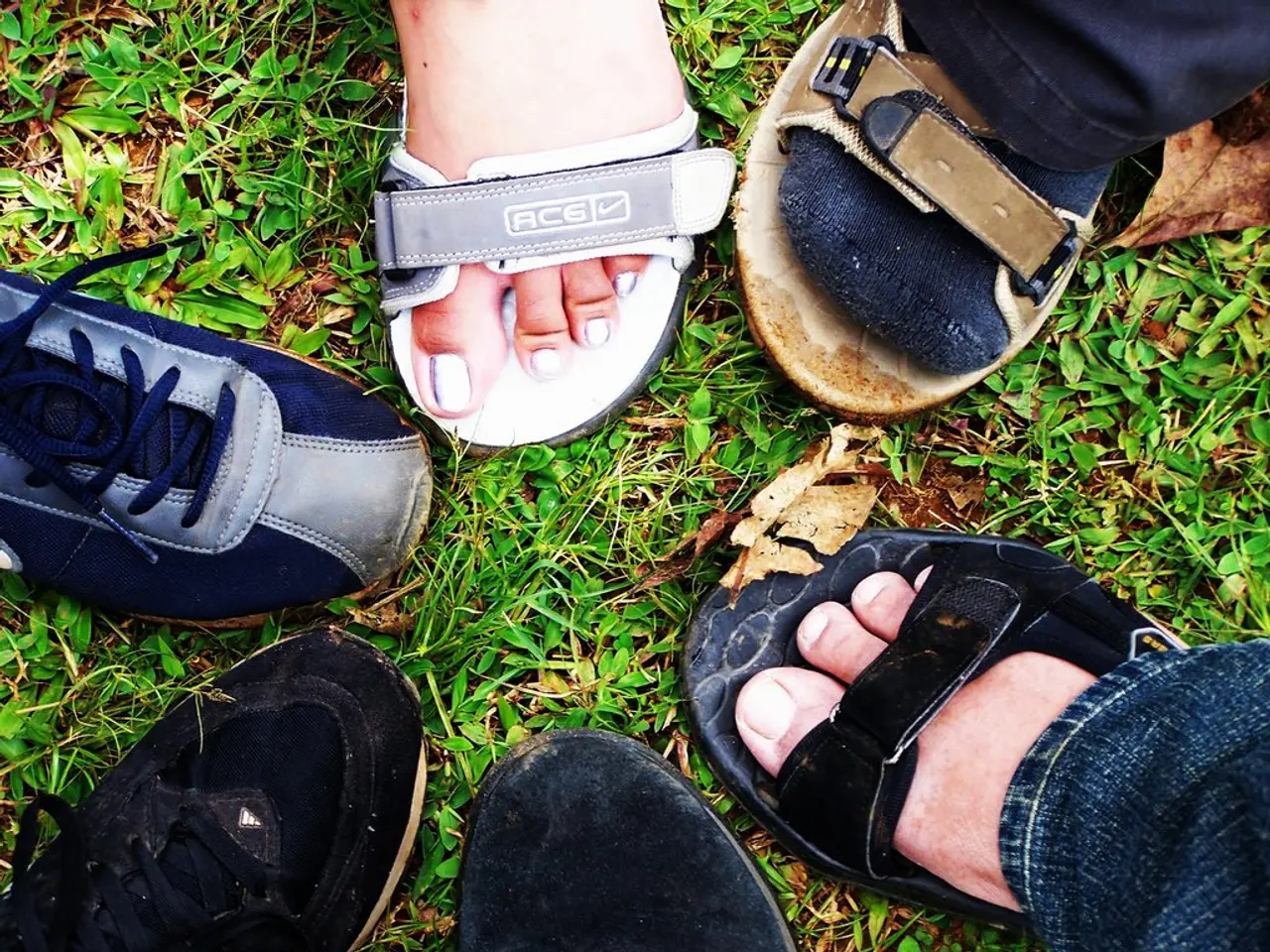Nighttime foot discomfort: Root causes, solutions, and reliefs
Foot pain at night can be a distressing experience, affecting many individuals for a variety of reasons. This article aims to shed light on some common causes and potential solutions for nighttime foot discomfort.
One common cause of heel pain is plantar fasciitis, an inflammation of the plantar fascia, a thick tissue band in the foot. The condition often worsens at night or after rest because the plantar fascia tightens during inactivity.
Another prevalent issue is peripheral neuropathy, a nerve damage that can result from diabetes or vitamin deficiencies. This condition leads to burning, tingling, or aching sensations, often worse at night.
Muscle cramps or nocturnal cramps in the foot and calf can also cause sudden aching or tight sensations during sleep, often linked to dehydration or low electrolytes. Additionally, venous insufficiency, where blood pools in leg veins when lying down, can cause aching and heaviness in feet and legs during night hours.
Skin conditions like dryness, allergic reactions, or fungal infections can also cause discomfort that may be interpreted as aching pain at night.
Treatment options vary by cause but commonly include wearing a night splint for plantar fasciitis to gently stretch the plantar fascia during sleep, moisturizing dry skin and using antifungal treatments for infections to reduce discomfort from skin-related causes, and managing peripheral neuropathy by controlling underlying conditions and sometimes medication prescribed by a doctor. Preventing muscle cramps can involve correcting electrolyte imbalances, staying hydrated, and gentle stretching before bed.
For those with jobs that require prolonged standing, regular foot exercises can help ease aches. Wearing comfortable, supportive footwear can also help prevent irritating the muscles and putting strain on the feet. In the case of Morton's neuroma, wearing well-fitting shoes, using shoe inserts or orthopedic pads, massage, steroid injections, avoiding high heels, tight shoes, shoes with narrow tips can help ease discomfort.
If foot pain at night persists or becomes severe, consultation with a healthcare professional or podiatrist is recommended to identify the exact cause and receive tailored treatment.
Individuals with fibromyalgia may experience foot pain at night due to lower levels of the anti-inflammatory hormone cortisol while sleeping. Treatments for fibromyalgia include anti-inflammatory medications, antidepressants, and sleep medications. Sciatica, a condition caused by a compressed sciatic nerve, can also result in severe pain that can be isolated to the feet.
By understanding the causes and potential solutions for nighttime foot pain, individuals can take steps towards alleviating their discomfort and improving their quality of sleep.
- Psoriatic disease can sometimes lead to foot pain due to inflammation and scaling of the skin, which may worsen at night.
- Asthma, a chronic respiratory disease, might not directly cause foot pain, but nocturnal asthma attacks can disrupt sleep, potentially exacerbating foot discomfort.
- Obesity, a significant risk factor for various chronic diseases, can also contribute to foot pain, as excess weight puts strain on muscles, joints, and nerves in the feet.
- Crohn's disease, an inflammatory bowel disease, can cause ulcerative colitis, which may manifest as foot pain due to inflammation in the joints and muscles.
- Diabetes, a metabolic disease, can lead to peripheral neuropathies, causing numbness, tingling, and pain in various parts of the body, including the feet.
- Eczema, a skin disorder characterized by redness, itchiness, and inflammation, can affect the feet and cause discomfort that may intensify at night.
- Health-and-wellness experts often suggest fitness-and-exercise habits to manage chronic-diseases like obesity and diabetes, which can indirectly help alleviate foot pain.
- Migraines, a neurological condition characterized by severe headaches, may also cause other symptoms such as muscle pain and sensitivity towards touch, including the feet.
- The American Quality of Life Questionnaire (AQ) can be used to assess the impact of various medical-conditions, including foot pain, on a person's overall quality of life.
- Inflammatory joint disorders like rheumatoid arthritis and other musculoskeletal disorders can cause foot pain that worsens at night due to increased pressure on the feet during sleep.
- CBD oil, a product derived from the cannabis plant, is sometimes used to manage chronic pain, including foot pain, though more research is needed to confirm its effectiveness.
- Mental-health conditions, such as anxiety and depression, can lead to conditions like restless leg syndrome, which can cause discomfort in the feet during sleep.
- Menstrual pain, a common symptom of premenstrual syndrome (PMS), can occasionally extend to the feet, causing cramps and general discomfort.
- Nerve damage, such as neuropathies, can lead to a variety of symptoms like numbness, tingling, and pain, which can affect any part of the body, including the feet.
- Science continues to uncover new causes and treatments for various medical-conditions, including nighttime foot pain, which can give hope to those seeking relief from this distressing experience.




